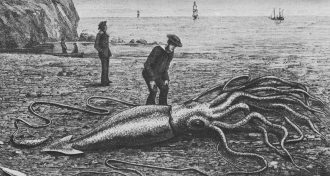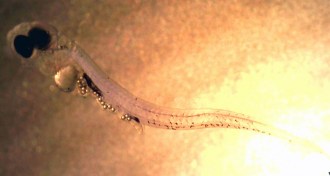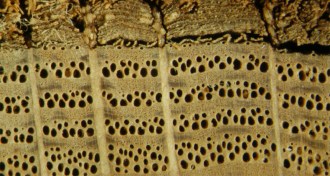Earth
Sign up for our newsletter
We summarize the week's scientific breakthroughs every Thursday.
-
 Environment
EnvironmentBikini Atoll radiation levels remain alarmingly high
Lingering radiation levels from nuclear bomb tests on Bikini Atoll are far higher than previously estimated.
-
 Animals
AnimalsMaximum size of giant squid remains a mystery
A scientist has come up with a new estimate of the maximum size of giant squid. He says the animals could be as long as two public buses.
-
 Animals
AnimalsTiny plastics cause big problems for perch, lab study finds
Researchers have linked microplastics to feeding behavior changes and development issues in Baltic Sea perch.
-
 Environment
EnvironmentTiny plastics cause big problems for perch
Researchers have linked microplastics to feeding behavior changes and development issues in Baltic Sea perch.
-
 Climate
ClimateReaders share climate change concerns
Readers respond to the April 16, 2016, issue of Science News with thoughts on climate change, prairie dogs and more.
-
 Climate
ClimateU.S. weather has gotten more pleasant, but will soon worsen
Warmer winters have made U.S. weather more pleasant since 1974 thanks to climate change, but that will soon change.
-
 Earth
EarthPlate tectonics just a stage in Earth’s life cycle
Plate tectonics is just a phase in a planet’s lifetime between conditions that are too hot or too cold for the planet-churning mechanism, new simulations suggest.
-
 Environment
EnvironmentDeepwater Horizon oil spill caused months-long ‘dirty blizzard’
Pollution from the 2010 Deepwater Horizon oil spill accumulated on the seafloor for months after the leak was patched.
-
 Earth
EarthPioneering geophysicist’s theory of peak oil still debated
The life of geophysicist Marion King Hubbert, creator of the “peak oil” prediction, was intertwined with the politics and science of the oil industry.
-
 Climate
ClimateClimate probably stopped Mongols cold in Hungary
Mongol cavalry was no match for cold, wet climate in medieval Hungary, researchers think.
-
 Climate
ClimateClimate-cooling aerosols can form from tree vapors
Climate-cooling, cloud-seeding aerosols can form in the atmosphere without the sulfuric acid spewed from fossil fuel burning, new research suggests.
-
 Animals
AnimalsAntibiotics in cattle leave their mark in dung
Treating cattle with antibiotics may have side effects for dung beetles, microbes and greenhouse gases.